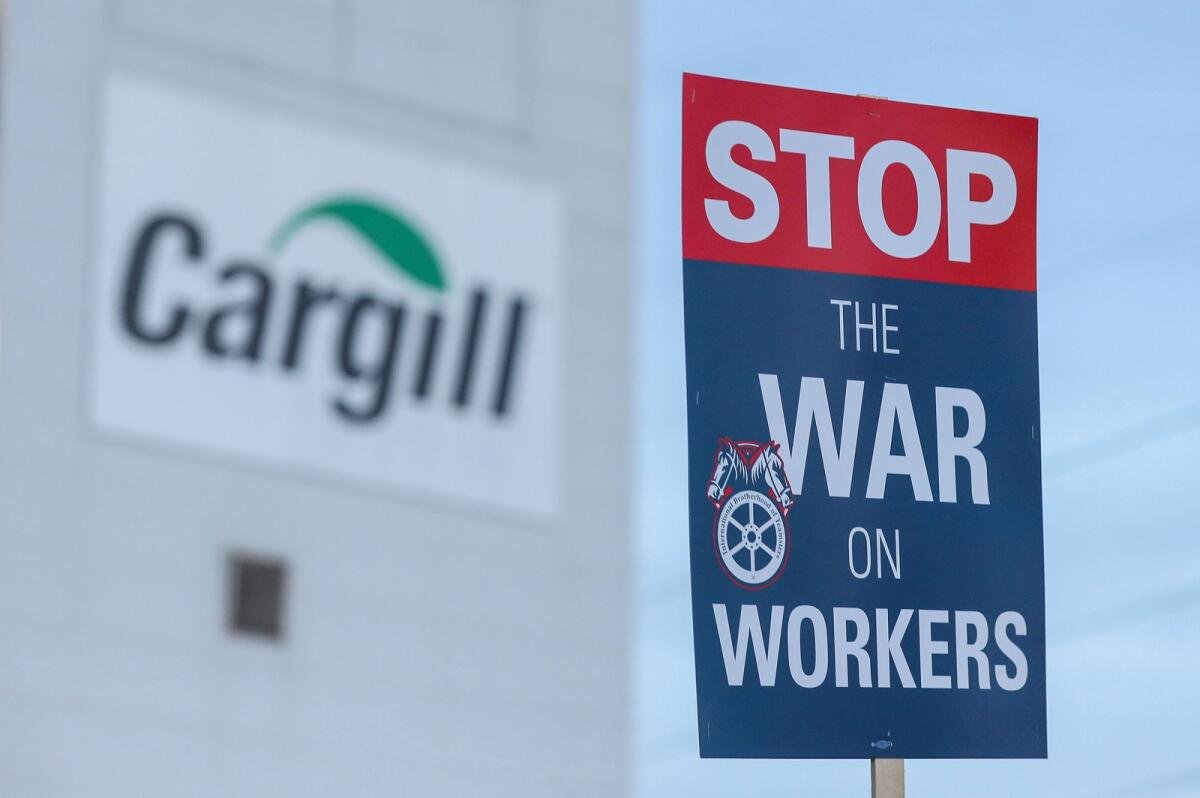The Gazette offers audio versions of articles using Instaread. Some words may be mispronounced.
CEDAR RAPIDS — Cargill will cut off health insurance for striking workers at its Cedar Rapids corn milling plant, according to a news release Friday from the local Teamsters union representing the workers.
Cargill, in a statement to The Gazette, said eligible employees who were enrolled in the company’s employee health benefits at the time of the strike will continue to receive insurance benefits through Thursday. If they remain on strike after that, striking workers would be eligible for benefits through a federal act called COBRA.
The federal law gives some employees the ability to continue health insurance coverage after leaving employment — for which they have to pay. It allows the employee to continue to be in the employer’s group health plan, usually at the full cost of the premium with no employer contribution, and with an administrative fee added.
Nearly 100 workers at Cargill’s corn milling plant near the Cedar River on 16th Street SE have been on strike since Oct. 1 over what they say is a refusal by the company to provide fair pay increases. The collective bargaining agreement between the 93 Cedar Rapids employees and the Minnesota-based crop trader and food maker expired early that day.
Teamsters Local 238, in a news release, called the insurance move by Cargill “cruel” and “callous.”
“This company’s hundreds of billions of dollars is built on the backs of these workers, and yet they choose to punish them and their families by taking away health insurance,” said Scott Punteney, business agent for Teamsters Local 238. “It’s a disgraceful tactic designed to force workers back into dangerous conditions for less than they deserve.”
Joe Kirchhoff, chief steward for the striking workers, added: “This isn’t just about pay anymore, it’s about basic human decency. Cargill has proven that they don’t care about us as people, only about their profits.”
Cargill, one of the largest privately owned companies in the world, reported $160 billion in revenues in its 2024 annual report released in August, a $17 billion drop from the previous year. It was the first time the company’s revenue had declined since 2019, and the largest drop in a decade. Cargill Chief Executive Officer Brian Sikes wrote in a letter that “the marketplace our people navigated this year was extremely challenging.”
The U.S. agricultural market is facing a downturn, with the U.S. Department of Agriculture forecasting a decrease in net farm income for 2024.
“Although we have not reached an agreement with the union committee, we remain open and willing to engage in further negotiations,” the company said in a statement. “We believe Cargill has offered a fair and competitive package.”
A federal mediator was brought in with the hopes of bring striking workers and company representatives back to the negotiating table.
Punteney told The Gazette earlier this month the union revised its proposal from a $4.80 per hour wage increase over three years to $4.50 per hour over three years, and that Cargill never responded or provided a counteroffer.
Punteney said the current median wage for operators at the Cedar Rapids corn milling plant is just under $30 an hour, or about $62,400 annually before taxes for an employee working 52 weeks of the year and 40 hours per week.
“It still puts them behind a lot of the other industries in town,” like Quaker Oats, General Mills, ADM and Diamond V, Punteney said of the union’s revised proposal. “They’re anywhere from $2.30 to $4.50 (an hour) behind other places now. So that brings them up in line, keeps them equal and tries to keep the standards up for everybody.”
Workers have described demanding work conditions, including a seven-day workweek and regular holidays worked.
“Teamsters Local 238 calls on Cargill to immediately reinstate health benefits and return to the bargaining table with a fair deal that respects the contributions of these essential workers,” the union said in a statement.
Comments: (319) 398-8499; tom.barton@thegazette.com







